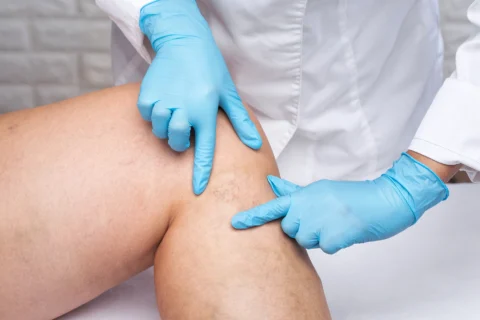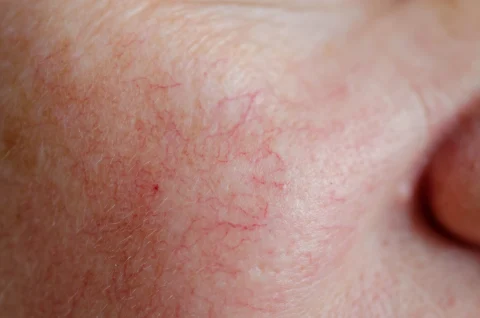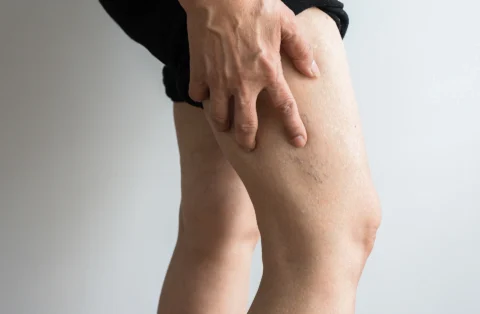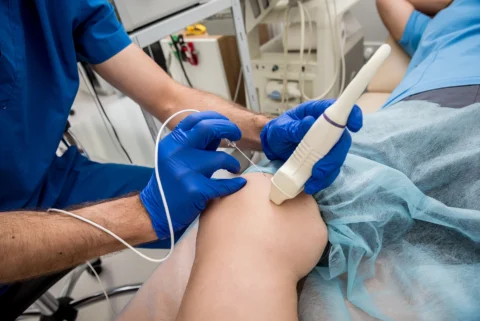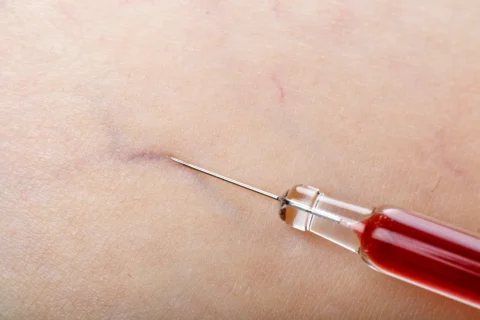Take control of your health and reclaim your freedom from frustrating hereditary telangiectasia symptoms

If you deal with what seems like constant nosebleeds or find yourself feeling exhausted way too often, you may be wondering what’s going on with your health.
While there are many potential causes for these frustrating symptoms, one possibility is an inherited condition called hereditary telangiectasia.
Hereditary telangiectasia refers to a group of rare genetic disorders that can affect blood vessels throughout the body. The symptoms and complications vary, but many people struggle with managing recurrent nosebleeds, appearance of skin lesions called telangiectasias, and abnormalities in iron levels. We understand that this can be an overwhelming diagnosis.
Our goal here at Vein Center Doctor is to empower you with the knowledge and support you need to take control of your health.
What You Need to Know About Hereditary Telangiectasia
One of the most common symptoms of hereditary telangiectasia is frequent, heavy nosebleeds that can be difficult to control.
You may also notice the development of telangiectasias, which are small clusters of dilated blood vessels visible as red/purple spots on your skin. The abnormal blood vessels in hereditary telangiectasia tend to be fragile and prone to rupture and bleeding.
While hereditary telangiectasia itself does not directly cause iron deficiency, the chronic blood loss resulting from nosebleeds and potential bleeding from gastrointestinal telangiectasias can lead to iron depletion over time.
If your body cannot replenish iron stores fast enough, this iron deficiency can progress to iron deficiency anemia.
How is Hereditary Telangiectasia Diagnosed?
Since symptoms of hereditary telangiectasia often develop gradually, diagnosis can be challenging. Doctors may use several strategies to determine if your symptoms are caused by this inherited vascular disorder:
- Detailed review of your personal and family medical history
- Physical exam looking for telangiectasias, especially in nasal and oral mucosa
- Specialized tests like CT scans to detect AVMs in organs
- Genetic testing to identify disease-causing mutations
The Curacao criteria are also used to aid diagnosis. These require three out of four of the following:
- Frequent, spontaneous nosebleeds
- Multiple telangiectasias visible on skin and mucosal surfaces
- Proven arteriovenous malformations (AVMs)
- A first-degree relative with hereditary telangiectasia
If your doctor suspects this diagnosis based on your symptoms and exam findings, they will likely order blood work to check iron levels and a complete blood count. Low iron stores and anemia are common in hereditary telangiectasia patients due to chronic bleeding.
How is Hereditary Telangiectasia Link to Iron Deficiency Anemia
One of the most concerning complications of untreated hereditary telangiectasia is progressive iron deficiency and iron deficiency anemia. With frequent bouts of bleeding from vascular lesions, your body has a hard time keeping up with iron losses.
Low iron negatively impacts the production of hemoglobin, the protein in red blood cells that carries oxygen. As iron levels drop, you may start noticing symptoms like:
- Fatigue, weakness, dizziness
- Shortness of breath
- Rapid heartbeat
- Pale skin or mucosal surfaces
- Headaches, difficulty concentrating
Monitoring iron levels through blood work should be part of your routine care if you suffer from chronic bleeding episodes related to hereditary telangiectasia. Your doctor can then advise you on diet changes or iron supplementation to prevent deficient stores.
What Causes Hereditary Telangiectasia

Researchers have identified a few key genes involved in blood vessel development that, when mutated, lead to this disorder.
The main genes are ENG, ACVRL1, and MADH4. Mutations in ENG and ACVRL1 account for over 80% of cases. These genes are involved in pathways that signal proper blood vessel structure and integrity. When they are defective, blood vessels don’t form correctly.
Hereditary telangiectasia follows an autosomal dominant inheritance pattern. This means only one mutated copy of the responsible gene has to be inherited from a parent to cause the disorder.
As the condition has high penetrance but variable expressivity, most individuals with these mutations develop symptoms, but severity can vary widely even within a family.
How Can You Manage Your Symptoms?
While there is currently no cure for hereditary telangiectasia, the good news is there are effective treatments available to manage your individual symptoms:
- Laser therapy and medication for recurrent nosebleeds
- Sclerotherapy for visible telangiectasias
- Embolization procedures to close off AVMs
- Iron supplements and infusions for deficiency
- Phlebotomy to reduce excess iron
- Medications that limit iron absorption
Lifestyle measures like avoiding contact sports and using humidifiers can also help reduce bleeding risks from fragile vessels. Having a comprehensive management plan tailored to your needs can greatly improve quality of life.
Why Choose Vein Center Doctor for Your Care?
Here at Vein Center Doctor, we have unparalleled experience diagnosing and treating all types of vascular conditions.
Our founder, Dr. Rahul Sood, is triple board-certified and specializes in minimally-invasive vein procedures. We will take the time to understand your symptoms, answer your questions, and create a personalized treatment plan.
With state-of-the-art facilities in New York and New Jersey, we offer treatments like sclerotherapy and embolization procedures right in our office. Our coordinated team ensures you get the comprehensive care you deserve.
Don’t Let Hereditary Telangiectasia Limit Your Quality of Life

We hope this guide has helped shed some light on hereditary telangiectasia and how it relates to iron metabolism in the body. As a complex, chronic disorder, management does require commitment and follow-up. But with the right treatment plan, you can minimize complications from bleeding and fragile vessels.
Contact us today online or by phone to take the first step toward a future free of hereditary telangiectasia complications!


